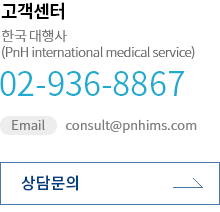면역치료 | 간암 CAR-T 임상 연구 (EECLC)
페이지 정보
작성자 HK HIS 작성일19-09-16 18:18 조회5,740회 댓글0건관련링크
본문
Study Evaluating the Efficacy and Safety With CAR-T for Liver Cancer (EECLC)
Brief Summary:
This single-arm,multicenter Phase 2 trial will treat the patients who have relapsed or refractory liver cancer with an infusion of the patient's own T cells that have been genetically modified to express a chimeric antigen receptor(CAR)that will bind to tumour cells that express the EPCAM protein on the cell surface.The study will determine if these modified T cells help the body's immune system eliminate tumour cells.The trial will also study the safety of treatment with CAR-T,how long CAR-T cells stay in the patient's body and the impact of this treatment on survival.
Liver Neoplasms
Biological: EPCAM-targeted CAR-T cells
Detailed Description:
This is a single-arm,multicenter Phase 2 study to evaluate the efficacy and safety of the CAR-T for Liver Cancer.The study will be conducted using a phaseⅠ /Ⅱ disign.The study will have the following sequential phases:Part A(screening leukapheresis,cell product preparation,and cytoreductive chemotherapy) and Part B(treatment and follow-up).The follow-up period for each paticipant is approximately 35 months after the final CAR-T infusion.The total duration of the study is expected to be approximately 3 years.A total of 25 patients may be enrolled over a period of 3 years.
Arms and Interventions
Arm
Experimental: Single-arm
Name:The Chimeric Antigen Receptor T Cell Immunotherapy (CAR-T) Dosage form:injection Dosage:100ml/time Frequency:0 days,the first day,the second day,28days,29days Duration:total five times
Interventions
Biological: EPCAM-targeted CAR-T cells
This study have only one arm that is CAR-T experimental arm. Firstly all participators will be attended the screening, who passed the screening for the treatment of CAR-T cells, the CAR-EPCAM-modified T cells can recognize and kill tumor cells in the body,follow-up 35 months.
Primary Outcome Measures :
1. Disease control rates [ Time Frame: CAR - T back to lose 0 days to 180 days ]
Tumor complete remission number + partial response number + number of stable disease /Total number of cases being treated
Ages Eligible for Study: | up to 75 Years (Child, Adult, Older Adult) |
Sexes Eligible for Study: | All |
Accepts Healthy Volunteers: | No |
Criteria
Inclusion Criteria:
1. According to UICC or liver cancer diagnosis and treatment guideline of diagnosis for hepatocellular carcinoma in patients with, the traditional treatment of invalid, advanced liver cancer, or postoperative relapse or refractory patients with hepatocellular carcinoma, and through flow cytometry or immune tissues (cell) chemistry, confirmation of tumor cells positive expression of relevant molecular targets;
2. Age <=75 years old, both male and female;
3. Is expected to survive more than 3 months;
4. Physical condition is good: 0-2 score ECOG score;
5. The lymphocyte count must > =0.4*10^9/L at the time of collection of peripheral blood;
6. Vital organs (heart, kidney) function is normal, there is no major wound healing. No serious virus, bacterial infection;
7. Non pregnancy and lactation;
8. History of severe allergic reactions without biological products;
9. Voluntary participation, good compliance,the subjects can cooperate with the experimental observation, and signed a written Informed Consent Form;
10. At least one measurable lesion.
Exclusion Criteria:
1. Pregnant or lactating women;
2. Organ failure, such as heart: Class III and IV; liver: to Chlid grading of liver function grade C; kidney: kidney failure and uremia stage; lung: symptoms of severe respiratory failure; brain: disorder of consciousness;
3. Patients with significant graft versus host disease (GVHD) after organ transplant history or allogeneic hematopoietic stem cell transplantation;
4. Long term use of immunosuppressive drugs or people with severe autoimmune diseases;
5. Any other chronic disease patients who have been treated with immune agents or hormone therapy;
6. A serious infectious disease with severe, uncontrollable, wound healing
7. Allergy to the interleukin and interferon cytokine;
8. Coagulation abnormalities and severe thrombosis;
9. Patients who have participated in other clinical trials or other clinical trials in the past 30 days
10. The Investigator believe the patients should not participate in this experiment.






